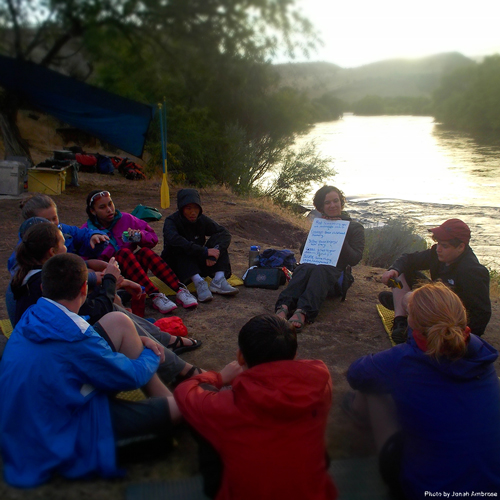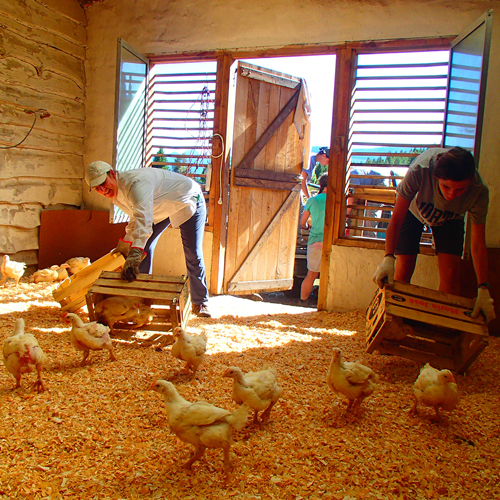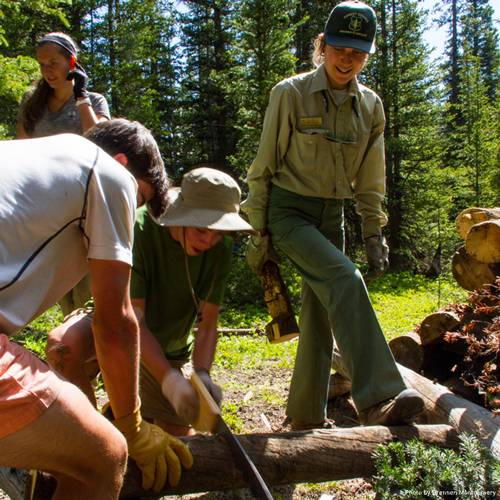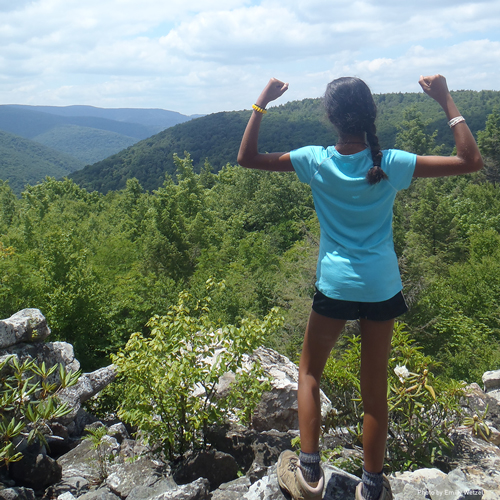Forests, lakes, and rivers; mountain ranges, rope, backpacks and canoes. White gas stoves, dried food, and dirty clothes. That just about sums up Outward Bound, right?
If you have ever worked for Outward Bound or gone on an Outward Bound course, then you probably know how the question plays out. People who are unfamiliar with Outward Bound typically have a somewhat accurate yet vague idea of what goes on. “You take people out into the woods,” they might say, or, “It’s all about getting outside.”
Whenever people ask me that kind of question, I assure them that they are not wrong; Outward Bound has quite a lot to do with the out of doors. However, I also tell them that the mission of Outward Bound is not to teach people how to be better rock climbers, better mountaineers, or better paddlers, but rather how to simply become better people. It is the model of the Schools to teach the messages of self-reliance, self-confidence, compassion and empathy through the medium of outdoor challenges.

Outward Bound teaches the messages of self-reliance, self-confidence, compassion and empathy through the medium of outdoor challenges.
Inspiring the world’s youth to be the best versions of themselves is not something as simple as teaching them math, or a language, or anything considered to be traditionally academic. The spectrums of self-improvement are so widespread and varying from individual to individual that there is nothing close to a “right way” to do it. Each person responds to the reality of their life in a completely unique way, which, in my opinion, is the beauty of the human race. The idea that “you are needed,” no matter who you are, is a critical ingredient to the success of Outward Bound programs. And it is this element of inclusiveness and reliance on teamwork that we can work to achieve these outcomes. One of the ways that we try to create empathy and understanding is not through any backcountry activity at all, but instead through an act of meaningful service.
The word ‘service’ can mean many different things to many people. The word might inspire thoughts of military service, or community service; it can have religious connotation, and perhaps even suggest the idea of taking something apart and putting it back together again so that it may work better. All of those are correct, as far as I am concerned; in the context of Outward Bound service projects, service is the act of contributing one’s time, efforts and energy toward something greater than oneself.

Service activities are a cornerstone for many Outward Bound experiences.
I work as a logistician for the Northwest Outward Bound School, located on the eastern slope of the Cascade mountain range in north-central Washington state. In a nutshell, working as a logistician means that I provide students on an Outward Bound course with their gear, food and transportation. I don’t get to see very much of what goes on during the courses themselves, but I always see them at the end, when the gear gets cleaned and checked back in, the students get their first shower in weeks, and we go out into our mountain valley’s community to perform service.
For most of our students, these service projects come in the form of helping out the local nonprofit organizations. We’ve worked on the local trail systems, setting sign posts at trail intersections; we’ve worked with a family planning service, helping them tidy up their grounds after a long winter. Many students go off to the combination middle and high school to help with the student garden, or go down to the food bank, recycling center, or the community’s local arts and business co-operative to lend a hand in whatever way is needed at the time.
Fortunately for us, there is never any shortage of things to do; fortunately for whomever we work with on any given service project, an increase of workers means that lots of things can get checked off their lists. These service projects definitely meet our outcomes, and are a great way for our organization to give back to and connect with the local community.

Outward Bound service projects come in a variety of formats, with the overarching goal of helping the community at large.
We have had opportunities to help people in true need. I doubt that I have to remind anyone of the fact that life on this earth can be chaotic and unforgiving. As lovely as our neck of the woods is, this part of Washington has had the state’s two largest wildfires occur in back to back summers. While a raging wildfire is a huge and obvious threat, the aftermath of a large fire is dangerous too. In many instances, hillsides are burned away, and with that lack of vegetation, many areas become far more susceptible to floods and landslides when rain finally begins to fall.
One of the most meaningful service projects that I have been a part of with the Northwest Outward Bound school came in the fall, two years after one of those big historic fires. Many of the homes in our area are nestled away in the crooks between hills and mountains, far from the valley’s towns and roads. Many of these houses were threatened by the fires, and then discovered that they were in flood paths, too. We went out to help a family who had petitioned a local non-profit for any relief and assistance that could be provided. Once there, all you had to do was look around to see and imagine the terrible force of the flood: tangles of trees and fences, embankments of mud, huge parts of the earth gouged as though sliced from the side of a hill and served away on a platter.
The primary reason we were there was to help the family collect their stores of firewood that had been washed out and caught in huge log-jams, as well as help clear out the knots of fallen trees. There were fourteen of us: ten students, and four Outward Bound staff members. It was the end of the 50 day course that the Northwest Outward Bound School offers to adults who want to develop the skills and experience necessary to become outdoor educators. These folks had spent weeks kayaking in the sea, training to become wilderness first responders, and mountaineering in the high places in the Cascade mountains. Now, their time with Outward Bound almost up, and with gloves on-hand we got to work.
We spent the bulk of that day digging through piles of debris, stacking firewood, gathering anything from twigs to huge branches together for burn piles. We helped the family cut more firewood, rake out new gravel where the old had been washed away. At the end of the day, the landowners had run out of things we could immediately help them with — many hands making light work, after all.

An Outward Bound service project often ends up being one of the most memorable experiences for a student.
Before we left, we gathered around a smartphone and looked at video footage taken by the family during the flood: it was a powerful experience to be able to look only a few yards away and imagine a huge, rushing torrent of water blasting through their property; it was incredible to see their property as it had existed before and during the flood event, and to look away from the phone’s screen and see the changes that had occurred — some of them positive, thanks in part to the efforts of our day of service.
A big piece of any Outward Bound course is the idea that it can be physically transformative. Students often come out of the mountains and are completely surprised by what their body can do, and service projects tend to reflect this process of transformation. Most of what we do — with the above anecdote as an example — is physically intensive work. The difference between scaling a mountain peak and toting load after load of soil in a wheelbarrow all comes down to the student’s frame of reference: service projects often mirror activities that people do in their day to day lives.
We look at a pile of stone in the alley, for example, or see someone else in the garden digging with a shovel, and think about all the times in our lives that we have had to do those activities. It can be hard work.
Going on an Outward Bound course is hard work, too; that’s the point. The courses are designed to push people beyond their comfort zones, and in doing so, expand the limits of their comfort, confidence, and knowledge of one’s own physical and emotional capabilities. At the end of a course students can take that back with them.
Many students say that service projects turn out to be surprisingly meaningful to them. Hopefully that feeling is something that sticks, as this world of ours has an unending need for service. In the chaos of today’s times, the most important thing we can do is recognize that fundamentally, we are all human, and sometimes, we all need help.
Service, ultimately, is about empathy: recognizing that we are all alike, and that we can provide for one another. Hopefully in these next decades, strength will not be measured by one’s might, but instead by one’s ability to empathize.
An Outward Bound student returns home. Socks are cleaned, showers are taken daily, and each meal consists of what is often referred to, in the end, as ‘real food.’ While knowing new knots or being able to roll a kayak are great skills, it is like I said in the beginning: it isn’t about teaching people to be stronger outdoor athletes, it’s about teaching people to be stronger.

Outward Bound courses build confidence and develop our students’ abilities to interact and work effectively with others.
About the Author
William Long is the Head Logistics Coordinator for the Northwest Outward Bound School in northern Washington state. A native of the western United States, he is a graduate of the University of California, Davis. In addition to his work with Outward Bound, he is a practicing fiction writer and an aficionado of good swimming holes.




